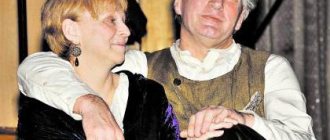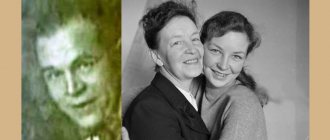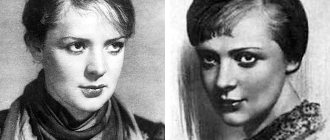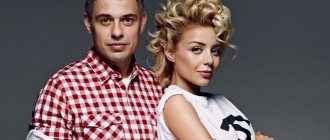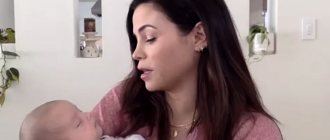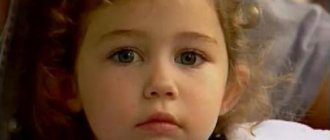Biography
Timur Kizyakov is a well-known TV presenter and author of program scripts. The TV presenter’s most famous project, “While Everyone is Home,” is known and loved in all corners of the country and even abroad.
Timur was born in the Moscow region, in the city of Reutov, which is located just a few kilometers from the capital. Timur’s nationality raises questions in the press; journalists call Kizyakov a Tatar, but the press has not received official confirmation of this assumption. The family of the future TV presenter gravitated towards technical specialties: his mother worked as an engineer, and his father served all his life shoulder to shoulder with military equipment and retired to the reserve with the rank of colonel.
TV presenter Timur Kizyakov
Timur himself did not think about anything other than a military career. Since childhood, Kizyakov has been involved in his own physical education, and after high school he applied to the Yegoryevsk Aviation School at DOSAAF and in 1986 graduated from there with the education of an MI-2 helicopter pilot.
But he did not want to remain in Timur’s service, so the young man went to receive higher education at a civilian university, but also a technical one. Kizyakov's choice fell on the Moscow Energy Institute. However, in fact, even as a freshman, Timur began working on television and by the time he received his diploma he had already had tangible success with viewers.
Social activities[ | ]
In 2006, he became one of the founders of the All-Russian information and retrieval system for adoptive parents “Videopassport”, created for the most effective placement in families of orphans and children left without parental care[4].
As of the beginning of 2020, more than 4,700 video passports have been created, more than 3,650 children have been placed in families and are at the stage of being transferred to families (the average effectiveness of the device is 77%). The Internet version of video passports is posted on the website www.videopasport.ru. The television version - the section “You will have a child” - is published in the program “When everyone is at home.” Since 2006, the section “You will have a child” has attracted and transferred more than 40,000,000 rubles to orphanages and children’s homes [ source not specified 509 days
].
For the creation of the Video Passport system in 2020, Kizyakov was awarded the Russian Government Prize in the field of mass media[5].
To protect against counterfeiting, the copyright name “Video Passport” was officially registered. Contrary to rumors that allegedly the authors of the “Video Passport” system are massively prohibiting the filming and placement of orphans in families, since 2006 there has been only one lawsuit, the basis for which was a lawsuit against a company specializing in apartment renovation that produced low-grade videos under the name "Video Passport". The trial was won, and legal support was provided free of charge by the famous lawyer Mikhail Barshchevsky[6].
In 2012, he was elected a member of the Public Chamber of the Central Federal District[2].
In February 2020, he joined the Supreme Council of the United Russia party[7], the proposal came from the Deputy Secretary of the General Council Olga Batalina[8]. The party plans to deal with the problems of placing orphans and television (the tongue-tied TV presenters and the lack of children's programs)[9].
Journalism
However, Timur Kizyakov got on television by accident. A friend of the future TV presenter, who studied at VGIK, told Kizyakov that there was a competition for the script of a new children's program and everyone could participate. The guy decided that he had nothing to lose and proposed his own idea to the leaders of the “Early in the Morning” project. And it was this idea that turned out to be winning and began Kizyakov’s creative biography on television.
Timur Kizyakov
Thus, since 1988, Kizyakov began working in the Main Editorial Office of Broadcasting for Children, both as a co-author and as the host of the program “Early in the Morning,” which replaced the popular Soviet Sunday children’s show “Alarm Clock.”
Childhood and family
Timur was born on August 30, 1967 in the small town of Reutov near Moscow, a couple of kilometers from Moscow.
Timur Kizyakov’s family was an ordinary Soviet family: his father was a military man, sent to the reserve with the rank of lieutenant colonel, his mother worked most of her life as an engineer. Timur was also an ordinary child: he loved to play with friends and, on the advice of his father, paid great attention to physical training. After graduating from high school, the young man, who was seriously thinking about a military career, applied to the Yegoryevsk Military School, where he began studying to become an MI-2 helicopter pilot. It was no coincidence that Timur chose his specialization: already in his teens he dreamed of the sky and flights.
Permanent host of the program “While everyone is at home”
However, already at the military school, Timur changed his priorities. Army life turned out to be completely different from what the creative guy had once imagined. As a result, already in his second year he began to doubt the correctness of his chosen specialty. No, no, he did not give up flying and eventually graduated from the Yegoryevsk Military School with honors, but at some point he decided to also get a civilian specialty. After leaving school, Kizyakov entered the Moscow Energy Institute (specialty “Automation and Remote Control”).
"While everyone is at home"
Later, with the collapse of the Soviet Union, this editorial office was transformed into an independent body, and Timur Kizyakov proposed a new idea - a morning entertainment program for the whole family, the guests of which were supposed to be famous and respected people. The new show was called “While Everyone is Home,” and the first person TV presenter Timur Kizyakov went to visit was the legendary actor Oleg Tabakov and his large family.
Timur Kizyakov in the program “While everyone is at home”
In addition to simple gatherings and communication, Kizyakov came up with the idea of diversifying his own program with various regular sections. Over almost 25 years, many of them were replaced, but the most popular remained “My Beast,” “Crazy Hands,” and “You’re Having a Baby.”
During his career, Timur Borisovich was a nominee and laureate many times for the title of best TV presenter of the year, according to the organizers of the professional awards “Golden Ostap”, “TEFI”, “Person of the Year”.
The hosts of the “While Everyone is Home” program are accused of profiting from orphans
10 years ago in Russia there were more than 140,000 orphans in orphanages, and there was no queue of Russian adoptive parents. The Kizyakovs’ attempt to promote a separate program about orphans on television was not successful, so it was decided to present one story about an orphan in the “While Everyone is Home” program. This is how the permanent column “You’re Having a Child” was born, the first such format in the history of Russian television. Already after the first releases, it became obvious that the responses of potential adoptive parents to videos about orphans exceeded all expectations.
For all the children shown in the section, there were parents, despite the fact that many of these children lived in orphanages for years. Then the understanding came that such a professional video is necessary for all orphans. But there are only 52 Sundays a year, which means that the Sunday program “While Everyone is Home” can show only 52 children a year. And the Kizyakovs came up with the idea of creating an information retrieval system for adoptive parents and adoptive parents, “Video Passport”. This system is available to all future parents on the Internet, at www.videopasport.ru.
There is an approximately 30-minute film made about each child, consisting of 7 thematic chapters. 10 years ago, even technically implementing this idea was not easy - it took the presenters more than a year and a considerable amount of their own funds to create this search system. The Kizyakovs registered the exclusive right to the “Video Passport” trademark with Rospatent. This fact, along with the cost of each video passport today, was one of the reasons for accusing the Kizyakov family of wanting not to help orphans, but to profit from them.
Over the ten-year history of the information retrieval system for adoptive parents and adoptive parents “Videopassport”, 4,150 video passports of orphans have been created, more than 3 thousand children have already been placed in families.
The other day, after attending a meeting at the Ministry of Education and Science, one of the bloggers published a post on social networks with the following content: “Many of you, of course, know the program “While Everyone is Home,” which is constantly hosted by Timur Kizyakov. I have always considered video stories about orphans who are looking for parents through this TV show to be very useful. But I thought it was a charity project of Channel One. How surprised I was to learn that, it turns out, Kizyakov makes video passports for orphans at the expense of the Ministry of Education and Science. One video passport - 100 thousand rubles. Tender per year - 10 million rubles.
And at the same time, as a representative of the Ministry of Education said at the meeting, Kizyakov is suing other charitable organizations that are trying, at their own expense, with the help of volunteers, to make such video passports for other children from orphanages, trying to place as many children as possible in families. He is suing because he registered the copyright for “Video Passport”. And most of the courts win, the Ministry of Education added. I'm disappointed in this business. That’s how greedy you have to be.”
After the publication, numerous accusations from bloggers rained down on the Kizyakovs, and a shadow was cast over the program. MK spoke with Elena and Timur Kizyakov to find out where the truth is.
“Firstly, you need to clearly understand,” says Timur Kizyakov, “that 100 thousand rubles is not worth a story in the “You will have a child” section, but a set of works aimed at placement in a family through an information retrieval system for adoptive parents and foster parents "Video Passport" Secondly, why does it cost 100 thousand? The video is shot by a professional team using modern technology. Each video passport is worked on by two operators, a lighting designer, a video engineer, a sound engineer, a journalist and an editor, editing and voice-over are carried out; any video passport can pass the quality control department of the federal channel.
You may ask why such an expensive video passport is needed? But only video passports provide 74% efficiency, i.e. 74% of children for whom video passports were created are placed in families. Any other information resources provide an efficiency of no more than 35%. Yes, the state is interested in our work with such efficiency. Maintaining one child in an orphanage costs the budget from 500 thousand to a million rubles a year, depending on the region. We have publicly stated more than once that the cost of a video passport is 100 thousand rubles. But for some reason, right now it has so excited bloggers. Did we disturb someone?..
At the meeting of the Ministry of Education and Science, which so excited the public, they discussed the need to pay closer attention to the quality of videos about orphans created by various organizations. Thus, one of the representatives of the Ministry of Education and Science said that he personally saw a story in which a voice-over said about a 14-year-old girl that she could be a “soft cat.” “Question: what goal are we achieving when we post this video with the link “adopt a child”? I have the impression that this is being created, apparently, for some other purpose,” said a meeting participant.
“As for our lawsuits,” says Timur Kizyakov, “there were only two of them, and they concerned only the ban on using the name “Video Passport”, and not the ban on the activities of these organizations to film orphans. We don’t want videos like those mentioned by representatives of the Ministry of Education and Science to be created under our name. We are only responsible for video passports created by our team.
The Kizyakovs believe that the requirements for creating videos about orphans should be regulated. According to the presenters, criteria for the content of the video, rules for working with children during filming, and the minimum qualifications of producers should be determined. The entire film crew of the “You’re Having a Baby” section has medical books, although no one requires them. Nevertheless, understanding the degree of responsibility, the Kizyakovs forced their employees to undergo a medical examination.
“Recently, we have been creating video passports for the so-called difficult-to-place orphans,” says Elena Kizyakova. — These are children with disabilities, children over 7 years old, brothers and sisters (there are also 5 or 6 children, who cannot be placed in a family one by one, only all together). For this category of children, having a video passport is especially important. Even before meeting the child in person, the future parent, being on the other side of the country, learns a lot about him. First of all, our task is to reveal the child’s personality, also show him in educational activities, analyze his workbooks and test books with the teacher, listen to the opinions of educators, psychologists, and talk in detail with the doctor about the child’s health. With this approach, we do not traumatize children with endless “watching events,” and future parents have unlimited time to make an informed decision about whether it is worth getting to know the child and whether they have the strength to raise and educate him. Because there is nothing worse for such children than returning to an orphanage. Future parents need to weigh their strengths even before meeting their child in person. A video passport provides such an opportunity.
A few days ago, a mother came to Khabarovsk from Yekaterinburg to pick up a girl with disabilities. The guardianship authorities were already desperate to find her parents, and the girl was going to be transferred from the Children's Home to the Home for the Disabled. Now Christina’s mother says she will do everything to get her daughter back on her feet. The Kizyakovs’ video passport again created a miracle. But, unfortunately, people are not gods and for every miracle, no matter how cynical it may sound, you have to pay with money.
EXPERT'S COMMENT
Evgeny BASOV, an employee of the guardianship authorities of the Chukotka region, who worked with the Kizyakovs:
“I worked for four years in the regional department of guardianship and trusteeship and was the regional operator of a data bank about children left without parental care. A real breakthrough in the field of guardianship and adoption was the appearance of the “You will have a child” section. They talked about the orphan child not from a position of pity, but from the position of his internal qualities. Showing children in the section is just the tip of the iceberg. The real know-how was the sensational video passports of children, in which there are many sections that allow future parents to have the most complete characteristics of the unborn child: psychologist, teachers, doctors, specialists from the guardianship authorities and, finally, the child himself.
There are some comrades who believe that making a video about a child is a matter of technique. It’s possible for 10 thousand, or even 3 thousand. So, I’ll tell you: it can be removed. But this is a profanation, it will be just a picture. I saw how Elena Kizyakova works. A true professional - journalist and child psychologist. Talking to children on camera for a few hours so that the child opens up is worth a lot. And this dimension is not in money, but in talent. In a few hours of working with a child, you need to clear away a bunch of the child’s psychological complexes and get to his original, family essence, that person who is without the guise of orphanage protection. Therefore, filming a child as he plays with dolls or cars does not create his psychological portrait. Therefore, it cannot be cheap. Moreover, it cannot be free.”
Personal life
Timur met his only wife Elena in 1997 at Ostankino. The girl was a professional journalist, a graduate of the specialized faculty of the Peoples' Friendship Institute. At the time of the meeting, Elena held the position of editor of the Vesti program.
Timur Kizyakov with his wife Elena
On Timur's part it was love at first sight. The TV presenter was not even stopped by the fact that his beloved was married. Kizyakov stated that he does not take away someone else’s wife, but takes his own wife. Soon Elena divorced her first husband and married a TV presenter. Today Timur and Elena not only live together, but also work in what is actually a family project, “While Everyone is Home.” Elena Kizyakova runs the “You will have a child” column there.
It also needs to be said that Timur has three children. Interestingly, it was decided to name the first girl Elena in honor of her mother, and Timur in honor of her father. And only the second daughter received the name Valentina, which is the only one in the apartment.
Timur Kizyakov with his family
From time to time, rumors appeared in the press that the TV presenter of a family show divorced his wife, but the Kizyakov family remains strong today, and such rumors are not confirmed.
The TV presenter does not seek to advertise his own personal life. There is no page registered on Instagram under the name of Timur Kizyakov, and the TV presenter is also not active on other social networks.
Dmitry Medvedev and spouses Timur and Elena Kizyakov
Today Timur Kizyakov has become seriously interested in political activities. Kizyakov believes that he can help the citizens of his own country, so he joined the supreme council of the United Russia party, where the TV presenter was personally invited by the representative of the general council, Olga Batalina. Timur Borisovich is going to deal with the issues of children left without parental care, and will also directly cooperate with television in order to try to minimize the tongue-tiedness of modern TV presenters, as well as positively influence the number of high-quality children's programs.
Family and Children
Elena Kizyakova worked in Ostankino as a journalist and editor of the Vesti program. At the time she met Timur, the graduate of the specialized faculty of the Institute of Peoples' Friendship was married. But after some time she got divorced. Moreover, Timur always stated that he did not take away someone else’s wife, but simply took his own.
Today, the couple are working on several projects together, including “While everyone is at home.” The family has three children. It is interesting that the first girl was named Lena in honor of her mother, and the boy Timur, like his father. And only the third daughter received the name Valentina.
The personal life of Timur Kizyakov is hidden “behind seven locks.” Sometimes information appears in the media that the Kizyakov family has broken up, but this is not so. A couple with many children lives quietly, calmly and simply does not want to share the secrets of their happiness with strangers.
Timur Kizyakov now
On August 15, 2020, the press learned that the program “While Everyone is Home,” one of Channel One’s oldest programs, stopped airing on the channel. The closure of the program was due to the termination of the contract between Channel One and Dom LLC, which is involved in the production of “While Everyone is Home” and is 49.5% owned by TV presenter Timur Kizyakov.
TV presenter Timur Kizyakov
Rumors about why Kizyakov was fired vary. The press talked about the TV presenter’s illness, about the conflict with the channel’s management, about personal and family problems.
The Vedomosti newspaper names two reasons why “While Everyone Is Home” is no longer broadcast on Channel One. First, the show's gradual decline in ratings is to blame. The second reason is cited by the media as a scandal that began in December 2020. The Meduza project was the first to write that Timur Kizyakov receives budget money for filming video profiles of orphans, which are shown in the “You’re Having a Child” section, hosted by the TV presenter’s wife Elena Kizyakova. According to rumors, each story about orphans under government orders cost 100 thousand rubles, which amounted to 35 million rubles over three years. At the same time, journalists noted that the TV presenter criticizes charitable foundations and organizations, as well as other producers of orphan profiles for filming unprofessional materials.
Timur Kizyakov
Other media outlets picked up the news. Immediately after a series of high-profile articles, the management of Channel One initiated an investigation. As RBC subsequently reported, the audit confirmed the fraud. Information also appeared in the media that Timur Kizyakov did not collaborate with other charitable projects of Channel One, except his own, and did not participate in the annual trips of the channel group to hospitals and orphanages in selected cities.
The TV presenter confirmed that the program “While Everyone is Home” will stop airing on the channel. But, according to Timur Kizyakov, this is happening on the TV presenter’s own initiative, and a letter to terminate cooperation was sent to Channel One back in May. The TV presenter cited new leadership methods, which Timur Kizyakov does not agree with, as the reason for his departure.
TV presenter Timur Kizyakov
Kizyakov criticized rumors of a scandal. The TV presenter claims that in this way the channel is trying to save face when old and popular programs break off cooperation with it. Timur Borisovich declared the media information unreliable and referred to the fact that the press does not provide the names of sources, which means it can publish fictitious rumors.
Timur Kizyakov is also supported by the fact that the TV presenter is not the first star to leave Channel One. Andrey Malakhov and Alexander Oleshko have already stopped collaborating with the channel.
Elena and Timur Kizyakov: union in the family and at work
Timur and Elena Kizyakov are famous TV presenters, familiar to almost everyone from the positive Saturday program “While Everyone is Home.” And yet, very little is said about the personal life of a celebrity.
It is known that Timur Kizyakov himself had no intention of becoming a journalist and TV presenter. His family is far from this: his father is a military man, his mother is an engineer. Timur graduated from the Yegoryevsk Military School with a degree in Mi-2 helicopter pilot, then from the Moscow Energy Institute. Timur Kizyakov came to television almost by accident, while still a student, he wrote a script for one of the children's programs. The editor liked his work, and they began to collaborate with Kizyakov further. He began working on various programs until, in 1992, the idea of a program for the whole family, “While Everyone is Home,” was born. Having become acquainted with the stories of various families, Timur realized that family happiness is possible. Timur met his wife Elena in 1997 at Ostankino. She graduated from the Faculty of Journalism at the Peoples' Friendship Institute and worked as editor of the Vesti program. Then she was married to another man, but Timur showed persistence, self-confidently declaring that he was not taking away someone else’s wife, but taking his own. Soon Elena met her first husband and they got married. At the moment, the Kizyakov family already has many children. They have two schoolgirl daughters, Elena and Valentina, and a son, Timur, born in 2012. In the Kizyakov family, preference is given to choreography and dancing as additional activities for girls. Elena previously did rhythmic gymnastics and believes that this gives her tone even now: she does not diet, but takes care of work and home. In the family of TV presenters, as Elena herself says, patriarchy reigns. Despite his goodwill and openness, Timur demands adherence to traditional rules in his family. He takes cleanliness and order in the house very seriously. Elena strives to maintain perfect cleanliness. Timur is strict in this regard towards children; he believes that breaking or throwing things and toys is fundamentally wrong, because they are bought with money that is earned by labor. The Kizyakovs believe that parents should do this kind of work so that their children can respect them for it. Mom and dad should not be ashamed of their work, because the example of parents is very important for the child. Timur and Elena work together. Since 2006, the program “While Everyone is Home” has opened a section “You will have a child,” where they show children from Russian orphanages. The video is only 4 minutes long, but filming the story can take a whole day. Elena says that working with children is not easy, so that the child opens up, they try to involve him in the filming process - they allow him to carry some objects, hold a microphone, often ask the staff to leave during filming so that the child is not constrained, if the children ask - they play with them. So, one boy unexpectedly answered that he wanted to become a builder, but now he wants to be an operator, like Uncle Misha. The information retrieval site “Videopassport” has a file cabinet for potential adoptive parents. The search is carried out by region of residence and year of birth of the child. You can look at photographs of the child, learn about his interests and achievements, watch a video of him, and learn from medical staff about the baby’s health. This site and the section in the “While Everyone is Home” program significantly increase the chance for children who are eagerly awaiting their parents. And the positive life turns in the family of the adoptive parents themselves are very impressive. The couple who adopted a child through the “While Everyone is at Home” program, who had not had the opportunity to give birth to their child for many years, were able to give birth on their own just a year after the adoption. Others, who adopted two boys at once, miraculously escaped the fire. Apparently what they say is true: do good and it will come back to you! Using the example of the Kizyakov family, one can see that it is quite possible to build family and partnership relationships at the same time, although this is not always easy. It is worth showing attention, patience, giving in to each other, and then all joint projects - within the family and outside it - will be quite successful and will benefit other people. Photo – Pravmir

